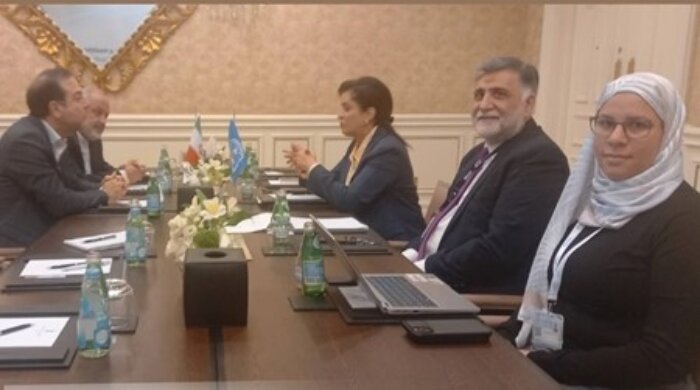Iran's health sector a role model in the region: WHO official

TEHRAN –The World Health Organization’s (WHO) director for the Eastern Mediterranean Regional Office (EMRO) has called Iran's health sector a role model in the region.
WHO EMRO is interested in expanding cooperation with the Islamic Republic of Iran, IRNA quoted Hanna Hasan Balkhi as saying.
The official made the remarks in a meeting with Alireza Raeisi, the Iranian deputy health minister, and Mohammad-Hossein Niknam, the deputy health minister for international affairs, on the sidelines of the Seventy-first session of the WHO EMRO.
A delegation led by Health Minister Mohammad-Reza Zafarqandi participated in the seventy-first session of the WHO EMRO which was held in Doha, Qatar, from October 14 to 17.
“During my short visit to Iran a few months ago, I became familiar with the capabilities of Iran in the health sector; Iran is a role model in health in the region,” Balkhi noted.
“Utilizing full potentials available in the [regional] countries is essential for us, and we will not hesitate to support the implementation of health programs,” the official noted.
Raeisi, for his part, enumerated priorities in the country’s health sector, namely completing the implementation of the family physician program and the electronic health record program.
Referring to non-communicable diseases as another important issue in the health sector, the official said, “Unfortunately, due to the crises in West Asia, the prevalence of non-communicable diseases has increased, and the onset age of non-communicable diseases such as diabetes and obesity has lowered.
Therefore, we are planning to control the risk factors from childhood through old age. To achieve the goal, we need to develop plans in cooperation with the World Health Organization.”
EMRO annual meeting
The annual meeting of the member countries of EMRO is one of the most important regional events in which Ministers of health and high-level representatives of the 22 Member States and territories of WHO’s Eastern Mediterranean Region, as well as representatives of partner organizations and civil society, will meet to discuss priority public health issues, make decisions, and regulations.
During the session, Balkhi was scheduled to present her regional vision for the endorsement of Member States. The vision, which aims to secure the best attainable level of health for everyone in the region, includes 3 flagship initiatives: expanding timely and equitable access to life-saving medicines and vaccines; building a more resilient health workforce, and reducing the morbidity, mortality, and social costs associated with substance use disorders.
The Regional Strategic Operational Plan describes what WHO aims to achieve in the coming 4 years in response to country priorities, and how it will do it.
The Regional Committee also included discussions of priority public health issues, technical papers, updates, and a wide range of panel discussions and side events.
Addressing the seventy-first session of WHO EMRO, Raeisi called on the WHO to establish a working group to address the impacts of unilateral coercive measures on health in the region and to develop possible solutions consistent with basic human rights.
The official further noted coercive sanctions have denied nations the right to access essential medicines and medical tools.
He also highlighted the significance of sharing precise data as well as having a collective commitment to universal health coverage to overcome the challenges in the region.
“To promote regional health, it is essential to identify the capacities, capabilities, and successful strategies in the region,” Raeisi noted.
The official also underscored the importance of political and social leaders’ commitments to public health, strengthening the global leadership of the World Health Organization, recognizing health as the basic ‘public good’, ensuring equal access to health for all countries, and enhancing the role of the World Health Organization in facilitating the share of knowledge and technology to all member states regardless of any political and economic barriers.
MT/MG
